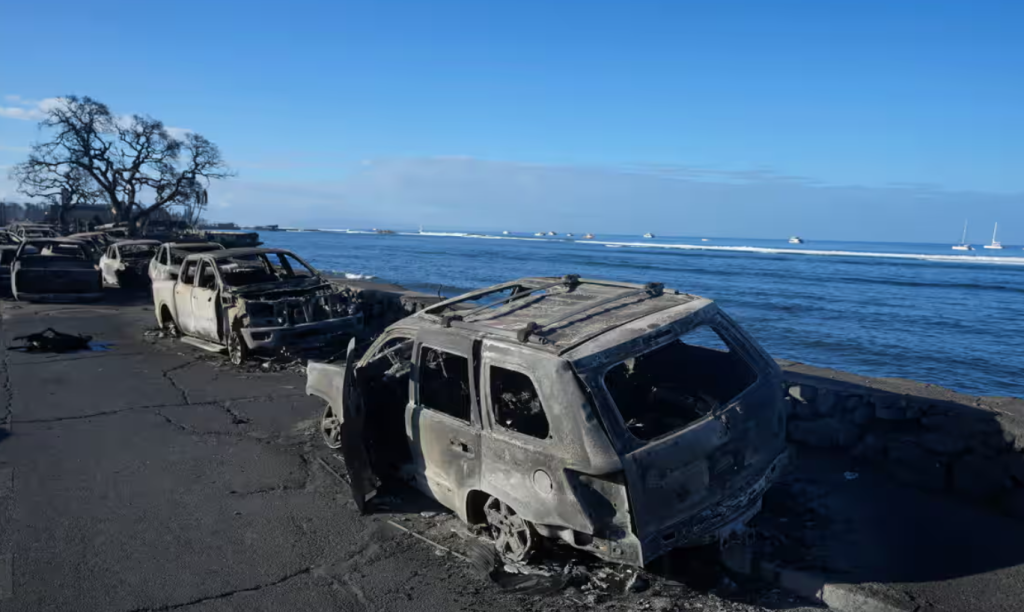Ana Carolina Penedo’s harrowing journey during the devastating Lahaina blaze in Hawaii’s former capital stands as a testament to human resilience and the power of the ocean as a sanctuary. As flames engulfed the historic city, leaving destruction and chaos in their wake, Ana faced an impossible decision that would change her life forever.
Amid the inferno, with flames dancing everywhere and the city’s cherished landmarks reduced to ashes, Ana Carolina Penedo found herself at a crossroads. She sat in her car, surrounded by fellow evacuees who were hoping for a miracle – a breakthrough in the traffic congestion that would allow them to escape the calamity. However, Ana knew that waiting was not an option. The fire was unrelenting, consuming everything in its path – shops, historic structures, and even a beloved 150-year-old banyan tree. Embers floated down onto pedestrians struggling to flee on foot, and Ana realized that the ocean was the only haven left.
Summoning her determination, Ana turned to her mother, her voice unwavering despite the chaos around them. “We have to get to the water,” she said, her mother agreeing despite not knowing how to swim.
They made a run for it, guided by instinct and a desperate need for safety. The ocean seemed like the only viable option in a situation devoid of warning or guidance from authorities. Jumping over obstacles, they reached the water’s edge, using it to douse the embers that clung to their clothes. Their fellow survivors, a diverse group that included infants and burn victims, joined them in the water – a makeshift refuge against the encroaching flames. Some clung to rocks, while others swam in the hopes of finding solace.
For hours, Ana and her mother remained in the water, alternating between moments of shivering cold and brief respite. Fear gripped Ana as she contemplated the potential worsening of the situation – the possibility of losing consciousness or needing to perform life-saving CPR on her mother. Amidst the turmoil, she provided comfort to her 69-year-old mother, offering reassurance that the worst was behind them.

It would be an agonizing eleven hours before the US Coast Guard and firefighters arrived on the scene, transporting the stranded survivors to safety. Looking back on the ordeal, Ana described it as a journey through hell. She had fought valiantly for her and her mother’s lives, facing unimaginable challenges head-on.
Tragically, the Lahaina blaze claimed the lives of at least 99 people, marking one of the deadliest wildfires in America’s history. As the search operation continues, that number could rise significantly. Ana and other survivors are left grappling with the aftermath, struggling to comprehend the trauma they endured and seeking answers about the failures that led to such devastation.
Ana’s frustration is palpable as she reflects on the lack of warnings and a clear evacuation plan on that fateful day. The absence of timely communication and organized response left her and many others feeling trapped and abandoned in their darkest hour.
The lead-up to the disaster had been tense for Ana due to high winds and power outages on the island. However, the fire’s outbreak caught her off guard; Maui’s warning sirens remained silent. The sight of billowing black clouds and flames revealed the magnitude of the emergency. The once-familiar Front Street was now choked with vehicles, and urgency drove Ana and her mother to action. “The fire is here,” her mother’s voice trembled.
The scent of smoke lingered in Ana’s hair, a constant reminder of the flames’ proximity. The aftermath blurred into a series of bureaucratic tasks – replacing lost documents, navigating a sea of challenges, and grappling with the staggering losses. Her home, her community, and her life were irrevocably altered. Amidst the chaos, she carried the weight of guilt for not evacuating sooner.
As Ana sought to rebuild her life, she found both solace and frustration in her community’s response to the tragedy. The lack of immediate external assistance was evident, leaving civilians to rely on each other for support. She questioned the government’s role and the timeliness of aid distribution, demanding accountability and explanations.
Amid the uncertainty, Ana drew strength from the kindness of friends and strangers alike. The days following the fire have been a blur of emotions, tasks, and questions about the future. Her temporary shelter, provided by a generous family friend, offers a moment of respite. Amid the upheaval, Ana’s focus remains on her young son, the driving force behind her determination to rebuild.
As she watches her son play, captivated by donated toys, Ana contemplates an unknown future. She yearns for her community to find the answers and support they need, knowing that recovery will be a lengthy process. The attention garnered by their plight will eventually fade, but their journey to heal and rebuild will endure.
In the face of tragedy and loss, Ana Carolina Penedo’s survival story stands as a testament to human strength, the resilience of communities, and the unwavering bond between a mother and her child.



